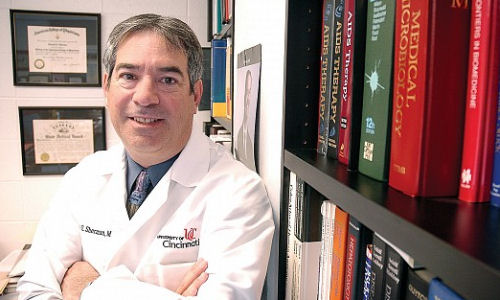Treatment of HIV patients co-infected with the hepatitis C virus (HCV) with an anti-retroviral drug therapy not only tackles HIV, but also reduces HCV replication, according to a new study led by a University of Cincinnati researcher.
Kenneth Sherman, MD, PhD, Gould Professor of Medicine and Director in the UC Division of Digestive Diseases in the College of Medicine
The results were published Wednesday, July 23, 2014, in Science Translational Medicine
Previously, physicians treating co-infected patients worried that HIV antiretroviral therapy might injure the liver to the detriment of patient health, says Kenneth Sherman, MD, PhD, Gould Professor of Medicine and Director in the UC Division of Digestive Diseases in the College of Medicine.
Literature in the 2000s seemed to support that stance, prompting Sherman and the team of researchers from UC and elsewhere to intensively study the two-year experiences of 17 patients co-infected with HIV and hepatitis C. The patients received already approved HIV antiretroviral drug therapies, but underwent frequent evaluation and sampling of blood so that minor changes in the virus and the immune response could be captured.
In a subset of patients there was an initial increase in serum ALT (a marker of liver injury), hepatitis C or both during the first 16 weeks. However, over a period of 18 months researchers found that viral loads for HCV returned to what was expected in a mono-infected patient suffering from HCV without HIV, says Sherman. Initial liver injury actually resulted from effective HIV treatment and not from toxicity.
“The drop in HCV viral levels was a big surprise and not what we necessarily expected,” Sherman says.
In the United States, 200,000 to 300,000 people have HCV/HIV co-infection, while worldwide estimates range from 4 million to 8 million people, according to Sherman. Physicians can use Sherman’s study results to better plan treatment for HIV patients co-infected with hepatitis C.
“There is a complex interaction of biological effects when patients are infected with both HIV and the hepatitis C virus,” Sherman explains. “Initial response to HIV treatment results in a transient increase in HCV viral replication and evidence of liver injury. However, over time HIV suppression leads to reduced HCV replication.”
“This process is highly modulated by down regulation of the interferon-responsive gene family,” adds Sherman, who led the study. “The findings suggest that HIV suppression with antiretroviral medications play an important role in the management of individuals with HCV and HIV infection. It supports the concept that in those with HCV/HIV infection early and uninterrupted HIV therapy is a critical part of preventing liver disease.”
Story Source:
The above story is based on materials provided by University of Cincinnati Academic Health Center.





